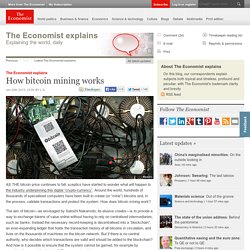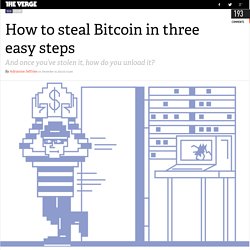

What is a Blockchain? Blockchain Technology Explained. This article has been brought to you by EarnBitcoins.info Your #1 Bitcoin Websites Directory Written by: David Schatsky and Craig Muraskin David Schatsky, Deloitte LLP, tracks and analyzes emerging technology and business trends, including the growing impact of cognitive technologies, for Deloitte’s leaders and its clients.

Before joining Deloitte, Schatsky led two research and advisory firms. He is the author of Signals for Strategists: Sensing Emerging Trends in Business and Technology (RosettaBooks, 2015). Craig Muraskin is managing director of the innovation group in Deloitte LLP. What is a Blockchain? BLOCKCHAIN, the “distributed ledger” technology that underpins bitcoin, has emerged as an object of intense interest in the financial services industry and beyond.
Signals What is a Blockchain? Consider this classic computer-science problem: A group of generals of the Byzantine army is camped with their troops around an enemy city. The Benefits of Blockchain Transparent. Immutable. Digital. Bitcoin and Cryptocurrency Technologies - Princeton University. About the Course To really understand what is special about Bitcoin, we need to understand how it works at a technical level.

We’ll address the important questions about Bitcoin, such as: Pogp1lh.png (PNG Image, 749 × 464 pixels) Can we discuss bitcoin flaws? Revisit blockchain.info listing by saivann · Pull Request #663 · bitcoin/bitcoin.org. Bitcoin Price Index - Real-time Bitcoin Price Charts. Bitcoin Price Passes $1,800 to Hit New Record High | Stan Higgins Bitcoin's price rose above $1,800 this morning, setting a new all-time high just over a day since passing the $1,700 mark.

Welcome to Forbes. The Economist explains: How bitcoin mining works. AS THE bitcoin price continues to fall, sceptics have started to wonder what will happen to the industry underpinning this digital “crypto-currency”.

Around the world, hundreds of thousands of specialised computers have been built to create (or “mine”) bitcoins and, in the process, validate transactions and protect the system. How does bitcoin mining work? The aim of bitcoin—as envisaged by Satoshi Nakamoto, its elusive creator—is to provide a way to exchange tokens of value online without having to rely on centralised intermediaries, such as banks. Instead the necessary record-keeping is decentralised into a “blockchain”, an ever-expanding ledger that holds the transaction history of all bitcoins in circulation, and lives on the thousands of machines on the bitcoin network.
But if there is no central authority, who decides which transactions are valid and should be added to the blockchain? Clever though it is, the system has weaknesses. How to steal Bitcoin in three easy steps. Earlier this month, someone pulled off the largest heist in the history of Bitcoin, the virtual currency that approximates cash on the internet.

The illegal drug bazaar Sheep Marketplace was plundered, either by hackers or insiders, and about $100 million worth of the currency was stolen from customers. Bitcoin heists are actually not uncommon. In June of 2011, a user named Allinvain was the victim of what is arguably the first recorded major Bitcoin theft. Allinvain awoke to find that a hacker had stolen about half a million dollars’ worth of bitcoins. “I feel like killing myself now,” he wrote at the time. $1.2M Hack Shows Why You Should Never Store Bitcoins on the Internet. Photo: Photo: David Ryder/WIRED Here’s your digital-currency lesson of the day, courtesy of a guy who calls himself TradeFortress: “I don’t recommend storing any bitcoins accessible on computers connected to the internet.”

That may sound like a paradox. Bitcoin is the world’s most popular digital currency, and it’s controlled by a vast collection of computers spread across the internet. But TradeFortress knows what he’s talking about. He’s the founder of inputs.io, a company that used to store bitcoins in digital wallets for people across the globe. Yes, bitcoins are digital. Until last week, inputs.io seemed like a nifty service for Bitcoin users.
But there was a catch. The site was compromised on Oct 23, and again on Oct. 26, and hackers made off with 4,100 bitcoins ($1.2 million) stolen in two separate attacks. Inputs.io doesn’t have the funds to pay back everything that was stolen, but TradeFortress says he’s going to issue partial refunds. Bitcoin mining is NP-hard. This post is (mostly) a theoretical curiosity, but a discussion last week at CITP during our new course on Bitcoin led us to realize that being an optimal Bitcoin miner is in fact NP-hard.

NP-hardness is a complexity classification used in computer science to describe many optimization problems for which we believe there is no algorithm which can always solve such problems efficiently. We’re not talking about the well-known hash puzzle portion of Bitcoin mining here in which miners race to find a block with an unusually low hash value-that’s hard by design.
Before hashing anything miners first have to assemble a candidate block by choosing which transactions to include from the set of all pending transactions. As it turns out, this requires solving two optimization problems, both of which are NP-hard!